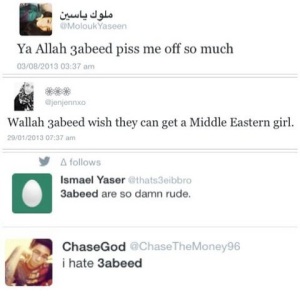

Responses to my calling out the term ‘Abeed’ - updated 3/3/2014
Dawud Walid
Posted Mar 3, 2014 •Permalink • Printer-Friendly VersionResponses to my calling out the term ‘Abeed’
by Dawud Walid
Two months ago, I wrote an oped titled “Fellow humans are not abeed” for the Arab American News to address the usage of the term abeed, meaning slaves, used by many Arabs to describe black people. After receiving some positive feedback from some of my Arab-American friends, primarily in Metro Detroit, I decided to search Twitter for the usage of this term in varying transliterations (abeed, 3abeed, 3beed, 3bid, 3abid & 3abed). What I found was very casual usage of the term, almost exclusively from teenagers and young adults, who are Arab-Americans and appear to have been raised in the USA.
I decided at this point to not comment directly to those tweeps, but to merely tweet my article at them with the hopes that they read it and stop calling black people slaves. What I’ve experienced from doing this as well as later engaging some of these tweeps in the past two months continue to be four things.
The first is that some simply have not responded to the article when I sent it to them. Some continue to tweet in which I have not seen them tweet abeed again. Others have continued to use the slur.
The second response is that some have actually apologized for using the term. Of those, some of them also said that they didn’t know abeed meant slaves. They said that their families simple refer to all blacks as abeed. This is a deeper structural issue of racism among Arabs, primarily in the Levant, which I plan on writing about later.
The third response is that of defending the usage of the term abeed that we are all abeedullah (slaves of Allah), and that I should stop being so touchy. Of course, this is insincere because they don’t really view blacks as the best worshippers, nor do they call other Arabs with light skin including their own family abeed. Calling anyone slave is haram (forbidden) anyway according to the Qur’an and Sunnah.
The last of the responses has been horrendous, which involve cussing me out to calling me a slave.
Some Arab-Americans who joined me in calling out the usage of abeed themselves have even been attacked. One tactic of shame used is calling someone “abeed lover” like how white supremacists say “nigger lover.”
An Arab American colleague of mine is in the planning stages of starting a national campaign to address not just this nomenclature issue, but the broader issue of anti-black racism among Arabs. Keep in mind that there are Arabs who have dark skin that would be considered black in the USA if looked upon strictly by physical characteristics.
In the interim, an Arab American friend of mine in Michigan has started the twitter account Arab AntiBlack Racism to call out anti-black racism among Arabs and to challenge fellow Arabs on Twitter not to be passive observers when seeing slurs hurled against blacks.
This issue is a race of the tortoise not the hare. There are deep roots of tribalism and colorism in the Arab world, which pre-date colonialism, were encouraged during colonialism and further solidified within many Arab Americans based upon America’s racial hierarchy.
I also keenly realize that if Muslims sincerely strive to effectively challenge Islamopobia, there needs to be a simultaneous effort to combat ethnic bigotry among Muslims. The Creator helps those who have spiritual integrity and authenticity. It’s not authentic to talk about Islamophobia and Arabophobia while being silent on its cancer-like manifestations among Muslims and Arabs. Also, this is not simply Arab on black racism that Muslims need to face. There is Somali on “Bantu” racism, black on white bigotry among some in Islamic centers, colorism between Pakistanis and Bengalis, etc.
Given, however, that the most overt discrimination that I see on Twitter is Arab on black racism and my personal interests as a black man, who has felt my share of anti-black racism in the heart of Arab America, Metro Detroit, I’m obliged to deal with this most entrenched form that I see. This is in no way an indictment on all Arab Americans. I do know, however, that this issue has been dealt with too passively for many years. Problems don’t fix themselves on their own as proof of the racism exhibited by those born and raised in the USA. I hope that my challenging it will push more Arab Americans to take more aggressive stands against anti-black racism.
Published 12/3/2013
UPDATE 3/3/2014
Dawud Walid has been actively working to end the use of this offensive term in the Arab and Muslim communities. He has been quoted in many mainstream articles. He has just published the following on Patheos Muslim:
Confronting Racism among American Muslims
Intra-Muslim racism is an issue often swept under the rug in the American Muslim community. Some of its manifestations are overt while its varying expressions tend to be more subtle. In order for us to be the community, which Allah (swt) describes as “the best nation brought forth from humankind (Quran 3:110),” we must put forth the same, if not more, intellectual and social energy in confronting intra-Muslim racism as we do when confronting Islamophobia.
A hurtful symptom of the disease of racism among us is seen in the derogatory terms that are used by many Muslims to describe people of various racial groups. From my observations it appears that Black Americans are the subjects of the majority of this name calling. It is not uncommon for Arabs from the Levant to refer to Blacks as abeed (slaves). In the South Asian community, Blacks or people with darker skin are sometimes referred to negatively as kallu (Black person). In the Somali community, it is also not uncommon to hear other Blacks being called jareer (nappy head) and adoon (slave). And even among some Nigerians and Ghanaians, there is widespread usage of the word akata (wild animal) to describe descendants of their former enslaved tribesmen, who are Americans.
There should be zero tolerance for these offensive terms or other names that attempt to relegate any ethnic group to a perceived status of inferiority. To demean, ridicule and/or call people names which the subjected group finds offensive are clearly forbidden in Quran: “And do not insult one another and do not call each other by [offensive] nicknames (49:11).” The point is not simply to refrain from using slurs but to not speak about fellow humans in a way that insults.
An example of this relates to a well-known hadith pertaining to the companions Abu Dharr (ra) and Bilal (ra). As narrated by Al-Bukhari and others, Abu Dharr (ra), during a dispute, insulted Bilal (ra) by calling him “Son of a Black Woman.” This was meant to put Bilal (ra) down, as his Abyssinian mother was a slave, though Abu Dharr was, himself, a Black Arab, as described by At-Tabari, ibn Hajar and others. Prophet Muhammad (saw) then told Abu Dharr (ra), “You’re a man with some of the characteristics of the Era of Ignorance/Pre-Islam (Al-Jahiliyyah).” Abu Dharr (ra) then went to Bilal (ra), placed his face on the ground and offered for Bilal (ra) to step on his face to atone for his verbal offense.
(Editor’s note, our last Altmuslim article also addressed this very hadith, which you can read about here.)Since the companions of the Prophet (s) had racist tendencies that needed purification, surely it should come as no surprise that our generation, which is far removed from the Prophet (s), needs spiritual purification and social remedies to counter the disease of racism. Simply saying Islam is against this illness is not sufficient. From the above example of the Prophet (s), the issue was confronted in public and attempts were made to restore justice to the offended.
Irrespective of faith, Blacks tend to be viewed in society as the wretched people who are not as beautiful as those with lighter skin. Confronting our own weaknesses and admitting that our community also has shades of institutionalized racism are difficult admissions. This especially holds true when racism is perpetuated by “People of Color,” who have been discriminated against historically from colonialism, illegal occupation and post-911 America. While some might think such racism is benign, it is racism that has divided the American Muslim community. It is problematic because racism is rooted in positional power, which prevents certain groups from having a voice or equal deference and authority within a community. I have witnessed new reverts to Islam who have been run out of the Muslim community due to racism.
We need a holistic approach for dealing with this issue, which includes individual introspection, regular community and organizational discussions, as well as more purposeful and meaning social gatherings that are multi-ethnic aside from big annual conferences. I am committed to being a part of such conversations and social events. I challenge all of my brothers and sisters to renew their commitment to ethnic equality within our community and to check those within our own cultural groups that are actively and passively perpetuating racism. This will require moral courage in the face of uncomfortable moments, but Islam calls us towards freedom, justice and equality that we may be the model community that Allah (swt) calls on us to be.
Please visit Dawud Walid’s excellent blog at http://dawudwalid.wordpress.com/ Type racism into TAM search engine for many more articles discussing this issue




